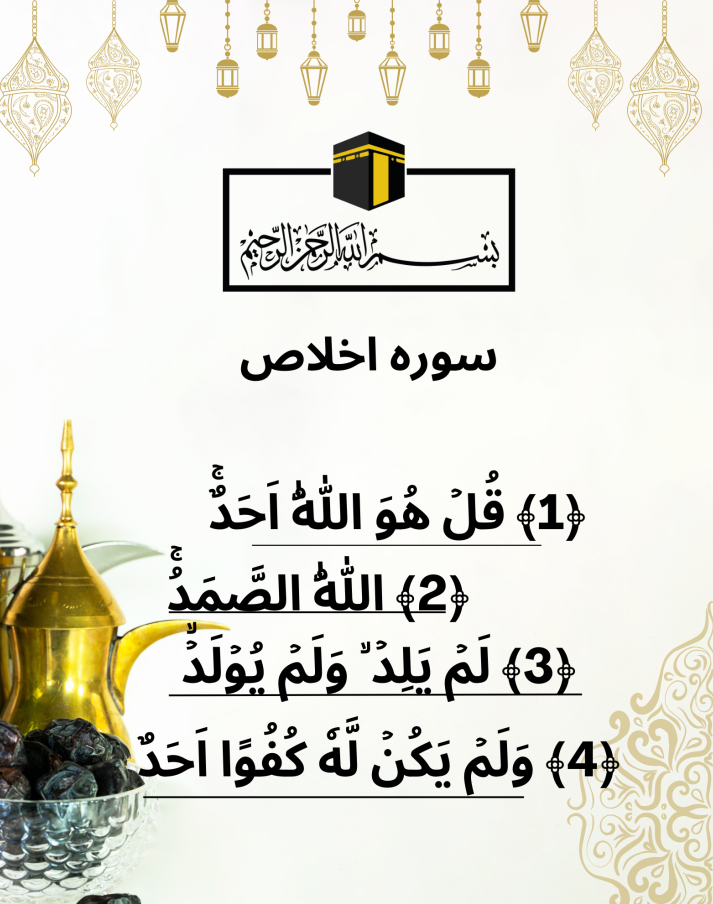Contents
Introduction to the 4 Qul Shareef:
Just as every surah in the Holy Quran holds great significance, the 4 Qul Shareef—four specific surahs—carry special importance as well. These four surahs are Surah Al-Kafirun, Surah Al-Ikhlas, Surah Al-Falaq, and Surah Al-Nas. Each begins with the word “Qul,” meaning “Say,” which is why they are collectively known as the 4 Qul Sharif.
The merits of these surahs are immense. For instance, reciting Surah Al-Ikhlas three times is said to grant the reward of reading the entire Quran. Surah Al-Kafirun emphasizes the concept of monotheism. Surah Al-Falaq offers protection from envy and the evil of harmful things, while Surah Al-Nas seeks refuge from jinn, whispers, and other evils. These four surahs are highly important in daily recitations for spiritual protection and guidance.




The Significance of the 4 Qul Shareef in Islam
The Holy Quran is a sacred book for Muslims, comprising 114 surahs (chapters), each holding a special place in Islamic teachings. Among these, four surahs are collectively known as the “4 Qul Shareef.” These include Surah Al-Kafirun, Surah Al-Ikhlas, Surah Al-Falaq, and Surah Al-Nas. The term “Qul” means “Say” in Arabic, and each of these surahs begins with this command, instructing the Prophet Muhammad (PBUH) to deliver specific messages to the people. The 4 Qul Shareef are immensely powerful and recited frequently for protection, guidance, and blessings.
In this article, we will explore each of these four surahs, delving into their meanings, significance, and how they are integrated into the daily lives of Muslims.
1. Surah Al-Kafirun (The Disbelievers)
Meaning and Context
Surah Al-Kafirun is the 109th chapter of the Quran and comprises six verses. It addresses the disbelievers and emphasizes the clear distinction between Islam and disbelief. The Prophet Muhammad (PBUH) is instructed to say to the disbelievers that he will never worship what they worship, and they will never worship what he worships. It is a powerful declaration of monotheism and religious independence.
Key Message
The central message of Surah Al-Kafirun is the firm rejection of idol worship and polytheism. It serves as a reminder to Muslims that their faith in Allah is unwavering, and they should not compromise their beliefs. It teaches Muslims to stand firm in their faith, even when faced with pressure or persuasion to adopt other beliefs.
Spiritual Benefits
Surah Al-Kafirun is often recited to seek protection from the influences of disbelief. It is said to guard a person against falling into shirk (associating partners with Allah). The surah is also recited in prayers to affirm one’s commitment to Islam and the belief in the oneness of Allah (Tawhid).
2. Surah Al-Ikhlas (The Sincerity)
Meaning and Context
Surah Al-Ikhlas is the 112th chapter of the Quran, consisting of just four verses. Despite its brevity, it holds immense significance in Islamic teachings. This surah is a declaration of the oneness of Allah. The word “Ikhlas” means sincerity, and the surah is a pure expression of monotheism, affirming that Allah is unique, eternal, and absolute. He neither begets nor is begotten, and there is none like Him.
Key Message
Surah Al-Ikhlas encapsulates the essence of Islamic belief in the oneness of Allah. It is often referred to as the “Tawhid Surah” because it declares the uniqueness and incomparability of Allah. This surah teaches that Allah is beyond human comprehension, has no offspring, and is free from the limitations of human attributes.
Spiritual Benefits
Reciting Surah Al-Ikhlas is said to bring immense rewards. According to a hadith, reciting this surah three times is equivalent to reciting the entire Quran. It is commonly recited for seeking blessings, protection, and forgiveness. Many Muslims recite it multiple times throughout the day, especially in prayers and before sleep, as it serves as a reminder of Allah’s singularity and greatness.
3. Surah Al-Falaq (The Daybreak)
Meaning and Context
Surah Al-Falaq is the 113th chapter of the Quran and has five verses. It is one of the two “Mu’awwidhatayn” or chapters of refuge. The surah is a prayer for protection from various evils, including the darkness of the night, the harm of envious people, and the evil of creatures that cause harm.
Key Message
The primary message of Surah Al-Falaq is seeking refuge in Allah from external forces of harm. It emphasizes that only Allah can protect from the physical and spiritual dangers that one may encounter in life. Whether it be natural calamities, the harm caused by others, or the envious intentions of those around us, the surah teaches that turning to Allah for protection is the ultimate defense.
Spiritual Benefits
Surah Al-Falaq is often recited for protection from evil eye, envy, and harmful situations. Many Muslims recite it before leaving their homes, traveling, or when they feel threatened by negative forces. It is also recited as part of the morning and evening supplications, along with Surah Al-Nas, to seek Allah’s protection throughout the day and night.
4. Surah Al-Nas (The Mankind)
Meaning and Context
Surah Al-Nas is the 114th and final chapter of the Quran, comprising six verses. Like Surah Al-Falaq, it is also a surah of refuge, but instead of seeking protection from external evils, this surah focuses on the internal threats posed by the whisperings of Satan (Shaytan) and other spiritual dangers. It calls upon Allah as the Lord, King, and God of mankind to protect from the evil whisperings that stir doubt, fear, and sin in people’s hearts.
Key Message
The central message of Surah Al-Nas is the need for seeking refuge in Allah from the evil within, particularly the harmful whisperings of Shaytan. It reminds Muslims that Satan’s whispers can lead people astray, causing them to deviate from the path of righteousness. By reciting this surah, believers ask Allah to guard their minds and hearts from these spiritual dangers.
Spiritual Benefits
Surah Al-Nas is a powerful surah for protection against internal struggles, such as doubts, anxiety, and negative thoughts. It is recited to seek refuge from the evil inclinations that can lead to sin. Like Surah Al-Falaq, it is recited in the morning and evening for comprehensive protection from both external and internal harm.
The Role of the 4 Qul Shareef in Daily Life
The 4 Qul Shareef holds a central place in the daily lives of Muslims. These four surahs are often recited for various purposes, including protection, blessings, and spiritual fortification. Many Muslims incorporate them into their daily routine, reciting them during prayers, before sleep, or as part of morning and evening supplications.
The recitation of these surahs serves as a constant reminder of Allah’s power, mercy, and protection. They help believers maintain a strong connection with their faith, shielding them from both visible and invisible threats. Whether it’s seeking protection from external harm, affirming monotheism, or seeking refuge from inner whisperings, the 4 Qul Shareef are powerful tools for spiritual well-being.
Conclusion
The 4 Qul Shareef—Surah Al-Kafirun, Surah Al-Ikhlas, Surah Al-Falaq, and Surah Al-Nas—are four immensely significant surahs of the Holy Quran. Each surah carries a profound message, from asserting the oneness of Allah to seeking protection from physical and spiritual harm. Reciting these surahs regularly brings numerous benefits, both in this life and the hereafter. They serve as a shield for believers, offering comfort, guidance, and protection in their everyday lives. As such, the 4 Qul Shareef are not only integral to the spiritual practices of Muslims but also stand as a testament to the comprehensive guidance provided by the Quran.

